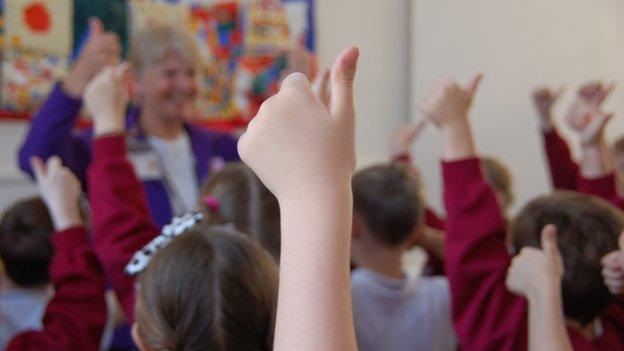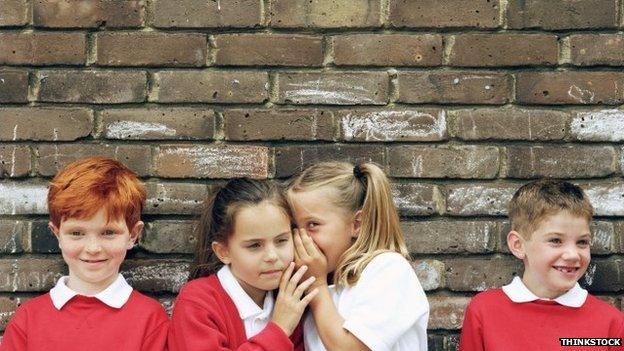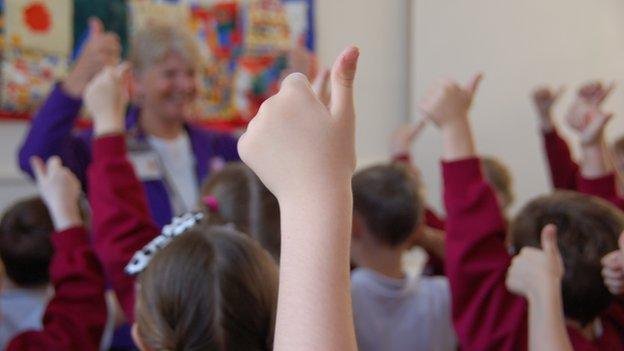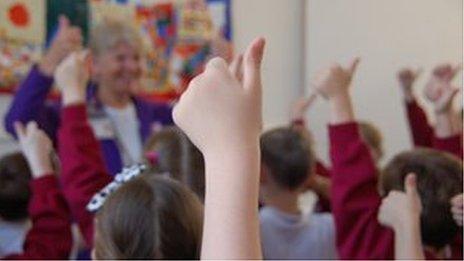Primary pupils need sex-and-relationships education, say MPs
- Published
- comments

MPs say there is overwhelming support from pupils, teachers and parents for mandatory sex-and-relationships education
All state primary and secondary schools in England should have to teach sex-and-relationships education (SRE), MPs have said in a report.
The Commons Education Committee's inquiry was launched after Ofsted found more than a third of schools were failing to provide age-appropriate SRE.
Committee chairman Graham Stuart MP said "young people have a right to information that will keep them safe".
The government said it would consider the findings carefully.
'Lack of clarity'
In 2013, Ofsted reported, external that personal, social, health and economic education (PSHE), of which SRE is a part, required improvement in 40% of schools.
The MPs said: "This situation would not be tolerated in other subjects, and yet the government's strategy for improving PSHE is weak.
"There is mismatch between the priority that ministers claim they give to PSHE and the steps taken to improve its delivery in schools," they added.
In particular, they said, there was a lack of clarity on the status of the subject.
The committee said the subject should be given statutory status.
This call is echoed in a wide-ranging report from the Office of the Children's Commissioner, published on Tuesday.
Deputy Commissioner Sue Berelowitz said "age-appropriate relationships and sex education" should be made a statutory part of the school curriculum.

The MPs fear relationships education is particularly squeezed under the current arrangements for the subject
The report from the Commons committee noted primary schools were not required to provide sex-and-relationships education beyond the basic biology dictated by the national curriculum, while at secondary level the national curriculum required schools to cover sexually transmitted diseases with 14- to 16-year-olds.
It said academies and free schools (about half of schools) were not bound by the national curriculum, though all schools must have regard to government guidance from 2000, external if they teach the subject.
The current position meant the relationships aspect of the subject may be particularly squeezed, the report said.
The committee said the subject's lack of statutory status meant it was too often sidelined, with teachers denied continuous professional training.
It recommended:
the Department for Education develops a "work plan" for introducing age-appropriate PSHE and SRE as statutory subjects in primary and secondary schools
the government endorses and publishes updated guidance on SRE from subject specialists, external
Ofsted resumes regular surveys of PSHE provision
schools consult regularly with parents on SRE provision, with parents retaining the right to withdraw their child
SRE be renamed Relationships and Sex Education
'Vital' role
Mr Stuart said there was overwhelming demand from teachers, parents and young people for SRE to become compulsory.
"SRE forms an important part of any school's efforts to safeguard young people from abuse and is particularly needed to protect the most vulnerable children," he said.
"PSHE builds character and resilience and will help young people to live happy and healthy lives."
A Department for Education spokeswoman said high-quality PSHE teaching played a vital role in developing young people's personal and emotional wellbeing, "supporting them to make informed choices and stay safe".
"That's why we are working with schools and experts to ensure the PSHE and relationships education that young people receive is appropriate and of a high standard," she said.
"We have already set up a new expert subject group on PSHE to identify key areas where teachers need further support."
However Sarah Carter, from the campaign group, the Family Education Trust believes many parents would be "horrified" by the materials used to teach sex education in primary school.
"It is not often age appropriate," she says. "Children develop at different ages, they have different levels of maturity.
"It would be our recommendation that parents always check what's being taught."
Lucy Emmerson, co-ordinator of the Sex Education Forum, said sex education was neglected in too many schools and urged all political parties to make a manifesto commitment to change the law to make the subject statutory.
PSHE Association chief executive Joe Hayman said statutory status for the subject would be "a huge step forward".
Shadow Education Secretary Tristram Hunt said Labour would make age-appropriate sex and relationship education compulsory in all state schools.
"Children and young people should be taught the importance of respect and healthy relationships and to understand the role of the family - in all its forms," said Mr Hunt.
- Published6 June 2014

- Published1 May 2013

- Published20 October 2013

- Published11 February 2014

- Published5 September 2013
